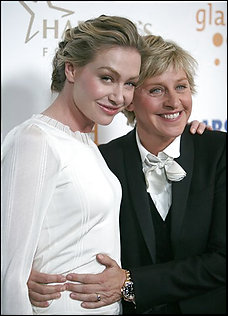
The marriage of Ellen DeGeneres to her Australian girlfriend Portia de Rossi has renewed criticism of our same-sex marriage laws.
Since same-sex marriages are not recognised by the federal government, the couple’s legal status will cease to exist when they visit de Rossi’s family here in Australia.
A Galaxy poll shows that 71% of Australians agree that same-sex partners should have the same legal rights as de facto heterosexual couples, while only 23% disagreed. The same poll showed that 57% agree that same-sex couples should be allowed to marry.
Australian Marriage Equality (AME) welcomes the decision made by the Californian Supreme Court last Thursday to overturn their ban on same-sex marriage, believing it places
greater pressure on the Rudd government to end discrimination here.
“It’s time the Australian government pulled it’s head out of the sand. This issue is not going away; they cannot just avoid it any longer. As the number of foreign jurisdictions which deliver full equality grows, Australia bigotry only becomes even more excruciatingly obvious,” said AME National Converter, Peter Furness.
California now joins Massachusetts as the only two US states that recognise same – sex marriage. Equal marriage rights already exist in Belgium, Canada, The Netherlands, South Africa and Spain with Norway and Sweden expected to join the group within the next few months.
The Marriage Act was amended in 2004 to explicitly state that marriage in Australia can only be between a man and a woman, and that marriages held in other countries won’t be recognised here.
Currently, Same-Sex relationships can be registered in the ACT and Tasmania but the government is opposed to them having marriage status.
Marriage is defined not only has a cultural practice but also as a binding contract in the eyes of the law, establishing the spouse as the next-of-kin, or a blood relative. In almost every important situation, such as making medical decisions or deciding property rights, the next-of-kin play a very important role.
At the centre of the argument against same-sex marriage is tradition. Those opposed argue that legalising same-sex marriage will destroy the concept of the traditional family, lead to increased sexual promiscuity and confusion over sexual identity in young people. However the biggest argument used by opponents is that marriage was originally designed as a means for having children, and since same-sex couples cannot procreate, they should not be allowed to marry.
Counsellor Erica Straun*, who’s mother has been in a same – sex relationship for over ten years, said “The main thing I hear from people who are against same-sex marriage is the ‘tradition’ argument. People say that the nature of marriage is that it be between a man and a woman. This is where I like to say ‘so if one of them has had a sex change it’s ok?’ I recall getting the answer ‘as long as the sex change is so good that you can’t tell.’”
The opinion of those that are at the heart of this debate is that allowing same-sex couples to perform Civil Unions would be a good start.
“Yes, I want to have my relationship recognised in the eyes of the law but I sometimes wonder if I actually want it to be ‘marriage’ in the traditional sense. In fact as a gay man I would be more than happy just for civil partnerships to be allowed in the ACT so that I can have a commitment ceremony to my man if I choose to, but also have the government recognise that my relationship is valid.” said David Willett.
Andrew Cox, who has been in a serious long-term relationship for some years now, agrees “I think the gays should have something that’s their own; different to a wedding/marriage that has similar legal rights…”
Another argument that has been retracted in the last few years is religion. As a large amount of marriages that occur in Australia are performed as Civil Unions, senator Joe Ludwig was hesitant to cite religion as a reason for Labour’s opposition at a meeting with AME in Brisbane in 2007.
Heterosexual Jill Dixon sums up popular opinion perfectly: “I support same-sex marriage and wish it was legalised in Australia. And I wish they’d take religion out of it. If the church doesn’t want to perform the ceremony in Church then at least let a civil union be recognised. These couples will spend the rest of their lives together so I don’t see why they don’t want it to be recognised by law. I don’t see how it’s different from any other couple.”
By Ilana Pender-Rose
*Name has been changed





